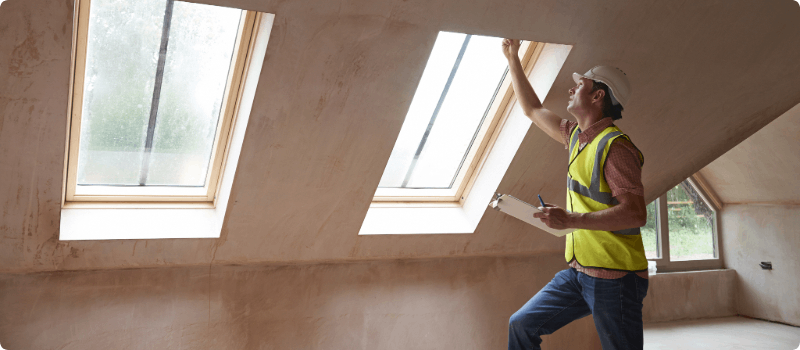What to know about purchasing a foreclosed home
Updated August 1, 2024 . AmFam Team
Few things in life are more exciting than owning your own home. And if you’re on the house hunt, you’ve probably found that foreclosed homes can be quite affordable.
Unlike a standard real estate purchase, buying a foreclosure requires a different purchasing process. So, before you pursue buying a foreclosure, consider these tips to land that home of your dreams.
What is a foreclosed home
A foreclosure is the legal process where the lender attempts to recover the balance of a loan from a borrower who’s stopped making payments on the home. The lender then puts the home up for sale because the home itself can be used as collateral to pay back the debt.
If you’ve bought a home previously through a conventional purchase, you’ll find a few differences in this process . You’re going to be dealing directly with the bank that owns the property, and they’re likely fielding multiple offers soon after the home has gone on the market.
Things to know before buying a foreclosure listing
There’s a lot to consider when buying a home, especially a foreclosed home. Keep these items in mind when you enter the market and start shopping for a foreclosure:
- Sold as-is. When buying a foreclosed home, what you see is what you get.
- Firm sale price. The bank has a firm debt to be recovered and can’t go any lower than the asking price. So, you’ll want to understand that you can’t negotiate the sale price.
- Required preapproval letter. Before purchasing, you’ll be required to have a preapproval letter from a mortgage lender for the selling bank to consider your offer. Take a look at our mortgage and home loans primer for important details on how the process works.
- One real estate agent. To cut down on commission costs, almost all foreclosures are brokered by a single real estate agent who’ll represent both you and the seller.

Foreclosure home purchasing
So, how does buying a home in foreclose work? There are specific steps to buying a foreclosure which actually make the transaction as efficient as possible, but even with that, the bank may impose greater requirements on buyers of their properties. Similar to buying a fixer-upper, foreclosed homes will likely need a lot of attention. Here’s what you need to know.
Find a foreclosure real estate agent or search for foreclosed homes
Locating a real estate agent that specializes in foreclosures can be very helpful to understand the process. They’ll get you details about hidden costs and other facts you’ll need to be aware of when buying a foreclosure. While you can also search online for foreclosed homes that are for sale in your area, you may want to consider a foreclosure real estate specialist. They’ll have insider information about when an unlisted home is slated to go on the market, giving you the advantage of preparing a bid in advance and then submitting it the moment the foreclosed home goes up for sale.
Get a pre-approval letter from your lender
Be sure that you’ve got a pre-approval letter in hand before you start shopping. The pre-approval letter is a document that identifies exactly how much your bank is willing to lend you. It’s also a requirement for most banks that are selling a foreclosed home. As these homes are in high demand, many qualified bids are going to be submitted at the same time. Being pre-approved will inform the selling bank that you’re seriously considering the purchase or their property, and it will speed up the process of your offer submission.
Review home prices in similar areas
Finding “comps,” or comparable homes of similar value located near your dream home, is the next step to complete when you’re thinking about buying a foreclosed home. Looking at residences like the one you’re considering can benefit you in many ways. Assessing the value of homes in that neighborhood gives you a price range and it will also tell if the costs you invest into the home are recoverable should you decide to sell the home after making renovations.

Get a home inspection
One of the most important factors in purchasing any home is finding a seasoned, local home inspector with great references. This person’s knowledge of home building and repair costs will become a key element in helping you to determine if the price of the foreclosure is worth the asking price — plus the cost of necessary repairs. And take into account the condition of the landscaping, too. Trees growing near drainpipes or along the foundation can spell big water seepage problems for the basement when the rains come.
Next, find local contractors that are able to work on the home in the near future. Foreclosed homes frequently require upgrades and renovations after you purchase and before you take residency there.
Make an offer on the home
In areas where homes are selling quickly, you’ll need to get your offer to the selling realtor soon after the home goes on the market. When finalizing your price, remember to take into account the fees that are typically paid by the seller, as these and other expenses are frequently expected to be carried by the buyer when purchasing a foreclosure. Most banks won’t negotiate, and more often than not, they’ll go with the first and highest bid at-or-above their asking price.
Foreclosed home purchase tips
Be on the lookout for foreclosures that linger on the open market because, very often, deal-breaking issues are lurking. It’s likely that the home may require significant repairs, or that liens are levied against the home that outweigh the home’s value. Also, if the home wasn’t winterized the significant costs required to repair that damage have likely deterred other buyers from taking the leap.
Buying a foreclosure is a slow process
Purchasing a foreclosed home is a lengthy process, even though the rush to make the offer may seem otherwise. In addition to the bank’s paperwork load that can slow the process, they may also indefinitely hold on agreeing to sell until a better offer comes along.
Buying a foreclosed home is competitive
Another tip for buying a foreclosed home is to keep in mind that foreclosed homes are a key target for people looking to buy, renovate and sell, or “flip” the home. And its low price will likely increase the number of bids submitted to the bank.
Have extra cash on hand
This is a frequently overlooked foreclosure purchase tip: some banks require you to have a certain amount of “liquid cash” (or cash-on-hand) for normal home purchasing. Although your bank may not demand that you do, it’s a great idea to have between 3-5% of the total purchase price of your home available in liquid cash to make necessary repairs.
Buying a foreclosure is a team effort. You, your expert foreclosure agent, experienced home inspector and contractors will all work together to make your dream home a reality. Another key player on this team is your insurance company and the homeowners policy you build to cover everything you’ve worked so hard for. Take a moment now and contact an American Family Insurance agent to custom-design a homeowners policy that’s right for you.
This article is for informational purposes only and based on information that is widely available. We do not make any guarantees or promise any results based on this information. This information does not, and is not intended to, constitute legal or financial advice. You should contact a professional for advice specific to your situation.
Tools & Resources
NextScripts
JSS component is missing React implementation. See the developer console for more information.

